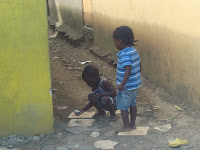My love of chickens and my love for the Island of Hispaniola
blossomed at the same time. Farming in New England afforded me a bit of time to
travel during the winter and I fell madly in love with the Dominican
Republic. My passion to share a vision
in creating a world where we connect with and treat our “food” in a dignified
way followed me in my travels. On the Island, I saw on the outskirts of the
cane fields the real cost of our sugar through the inhumane conditions in which
these workers were subjected.
Segregated in the Batey, the shanty towns where
the Haitian Cutters and their families lived, I learned the land and animals
are not only ones who suffer in our cold and ruthless quest for cheap food.This summer, as part of the ongoing, centuries old tensions between the Dominican and Haitian governments, the Dominican Supreme Court ruled to revoke the citizenship of all Haitians immigrants who could not prove their legal status all the way back to 1929.
This has left the children, grandchildren and great grandchildren of the cane cutters without a country. Born, raised and living in the Dominican Republic, these children of Haitian decent have not rights, no legal way to travel, marry, work or receive an education and as of now, no hope for their future.
Many friends and colleagues have been forwarding me articles
speaking to the International outrage over this ruling. The solution being put
forth by many in the International community is to boycott travel to the DR and
places the blame for the situation solely on the Dominicans. This is not only
unfair to the average Dominican citizen, it is unwarranted and continues to
absolve the responsibly every one of us plays in this horrific human condition.
The Dominican government is faced with limited resources on
a small Island with millions of people and an extremely unstable situation in
bordering Haiti. It does not solely own the cane fields, nor due the resort
employees who will be the first to suffer with any kind of significant travel
boycott. The Dominican Government is not to blame for the economic reality that
sugar that is only available to us through the abuses and inhumane treatment of
the workers who cut the cane.
They play part their part, but so do all of us.
They play part their part, but so do all of us.
As long as we continue to demand full shelves with every
imaginable food, at every moment of every day at a hugely subsidized cost, these
moral violations of all living beings will continue. Relying on corporations,
who are driven only by profit, to provide us with our food, will guarantee the continuation
of the atrocities to our land, our animals and our fellow human beings. People
are designed to care, but we care in small intimate settings. When we lose a
direct connection to our food, we lose our ability to care.
Eating and buying local affords us the opportunity to
support a size community for which we can care. Those foods which cannot be
supported with the local community should be expensive, rare and hard to obtain.
Cheap food, grown harvested, and butchered far away from our everyday
experience has made us forget how labor intensive and difficult it is to
produce and distribute.
The cane cutters are only one example of the hidden costs in
our food. Behind the scenes of this inexpensive commodity is essentially
slavery. It always has been. The plight
of the Haitians in the Dominican Republic is not because of a barbaric
government, but rather a barbaric world.
We live in a world where we continue to turn a blind eye to our moral compass in our demand for the cheap abundant selection on our grocery shelves. If we really care about the Haitian sugar cane workers in the Dominican Republic, or the hens in the layer factories, then the change needs to start with us, and our expectations and relationship with our food.











